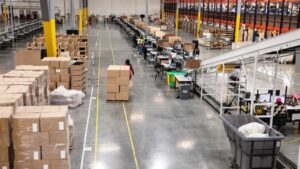In the world of modern commerce, where convenience and choice reign supreme, the process doesn’t always follow a one-way street. While consumers eagerly embrace the simplicity of online shopping, a less glamorous journey awaits some of those products once they arrive at their destination. This journey takes them on a path known as reverse logistics, where returns and recalls become pivotal components in the intricate dance of supply chains.
At Unilogic, we understand the intricate dynamics of reverse logistics, making us your trusted reverse logistics experts. In this blog, we’ll delve into the world of returns and recalls in the e-commerce landscape, shedding light on the challenges and opportunities that arise along the way. Join us on this journey as we explore the art of managing reverse logistics with precision and expertise.
What Are Reverse Logistics?
Reverse logistics refers to the process of managing goods and materials as they move backward through the supply chain. In other words, it’s what happens when products need to be returned, recycled, repaired, or disposed of after they’ve been sold to customers. As reverse logistics experts, we can explain.
Think of it as the “undo” button for logistics. Instead of products flowing from manufacturers to customers, reverse logistics deals with the flow of products from customers back to manufacturers or other points in the supply chain.
This is important because it helps businesses handle returns, recalls, recycling, and waste management efficiently, saving resources and reducing environmental impact. Reverse logistics ensures that products don’t go to waste and can be reused, repaired, or properly disposed of, which is good for both businesses and the planet.
Why Reverse Logistics Isn’t Always Widely Adopted
While reverse logistics can be environmentally beneficial and cost-effective in the long run, it’s not as widely practiced as forward logistics (the process of getting products from manufacturers to customers) for several reasons:
- Complexity – Reverse logistics expertise can be more complex than forward logistics because it involves dealing with returned, damaged, or unwanted goods. Managing the flow of products in reverse requires careful planning and efficient processes.
- Costs – Setting up and running a reverse logistics system can be expensive. It involves transportation, sorting, and disposition of returned or unsold products, which can incur additional costs for businesses.
- Lack of Awareness – Some companies may not fully understand the potential benefits of reverse logistics or may not be aware of how to implement it effectively.
- Resource Constraints – Small and medium-sized businesses may lack the resources, such as storage space and transportation, to handle reverse logistics efficiently.
- Regulatory Compliance – Different regions and industries have specific regulations regarding the handling and disposal of certain products, which can add complexity to reverse logistics processes.
Despite these challenges, many businesses are increasingly recognizing the importance of practicing reverse logistics. As environmental concerns grow and consumers demand more sustainable practices, more companies are exploring ways to incorporate reverse logistics into their operations. This is why third-party logistics providers specializing in reverse logistics services can help businesses navigate the complexities and cost-effectively manage their returns and recycling processes.
Why Is Ecommerce The Number One Reason Behind Recalls
As online shopping continues to surge, there’s a growing issue that comes with it: an increase in product returns. This trend is particularly noticeable when comparing in-store and online shopping. While shoppers typically return 5 to 10 percent of their in-store purchases, the return rate for online purchases can range from 15 to 40 percent. Part of this difference is because online shoppers can’t physically touch and see the products before buying.
Online shoppers also tend to have different shopping behaviors. They might order multiple sizes or colors of a product to try at home, returning what doesn’t fit or suit their preferences. Retailers often cover the shipping costs for these returns, both ways in some cases. As a result, retailers face rising expenses associated with handling returns and understanding why customers send items back.
To address this challenge, new businesses are emerging to help retailers manage returns more efficiently. Take for example Kohl’s, a prominent retailer with over 1,000 physical stores. They provide a practical illustration of the reverse supply chain in operation. Kohl’s has established a partnership with Amazon, where they receive, inspect, and send back Amazon returns in a consolidated shipment. This arrangement benefits customers who prefer in-person returns while also driving foot traffic to Kohl’s stores from individuals who might not typically shop there. Additionally, Kohl’s stocks certain Amazon products and can easily return them if they don’t find buyers.
Experts predict that as e-commerce continues to grow globally, the volume of returns will also rise significantly. In the coming years, it’s estimated that returns in the e-commerce sector could surpass a trillion dollars annually, emphasizing the need for effective reverse logistics solutions.
Unlocking the Power of Reverse Logistics Experts with Unilogic
In the realm of logistics, especially reverse logistics, challenges abound, and the need for effective solutions is ever-increasing. Unilogic, with its expertise and comprehensive range of services, stands ready to assist businesses in navigating the intricate world of reverse logistics.
Unilogic’s dedication to excellence in reverse logistics is evident through its fulfillment services, which encompass vital functions like inventory management, order packing, and shipping operations for ecommerce businesses.
Whether it’s managing returns, recalls, or optimizing the entire reverse logistics process, Unilogic offers tailored solutions to tackle the unique challenges faced by businesses. Our commitment to sustainability means that we are always exploring innovative ways to reduce waste, cut costs, and minimize environmental impact. We work closely with our partners to devise strategies that not only enhance their bottom line but also contribute positively to the planet.
Partner with Unilogic to harness the full potential of reverse logistics and elevate your business to new heights.





